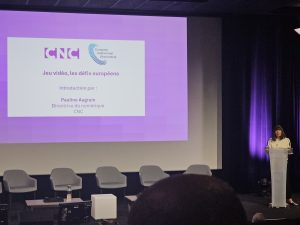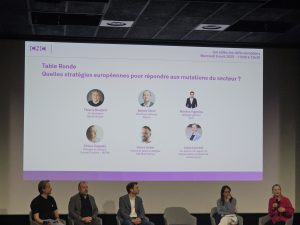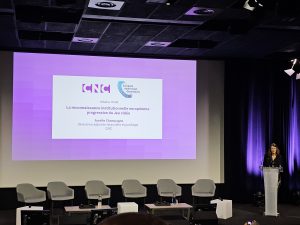On Wednesday 9 April, the CNC presented the European Audiovisual Observatory’s report “Legal Challenges and Market Dynamics in the Video Games Sector”, with speeches by various stakeholders from the CNC, SELL, Spielfabrique, Nacon and Oldskull Game.
Current state and major challenges
- Market structure: Europe has around 5,300 video game studios, mainly concentrated in Sweden (900), Germany and France, while emerging players such as Spain and Romania are showing growing potential. Despite this diversity, the continent suffers from fragmentation in terms of support mechanisms and access to funding. This limits the emergence of major players capable of competing with their American or Asian counterparts.
- Lack of access to competitive financing: Private funding remains a major challenge, particularly when compared with centralised Chinese or American venture capital (VC) models. In addition, European funding, while important, is often complex and not easily accessible.
- Training and skills: While European schools train excellent creative and technology professionals, they do not sufficiently encourage entrepreneurship. This hinders the creation of solid, independent studios.
Greater commitment from the European institutions
The main bodies of the European Union have gradually become aware of the importance of the sector and have committed themselves to supporting it.
- The European Commission: In 2022, it set up an action plan for media and audiovisual, aimed in particular at facilitating access to funding for innovation and research. Ten workshops entitled Understanding the Value of Videogames in Society were organised, bringing together professionals to analyse the impact of video games on society. An in-depth study of the economic and societal impacts is planned for 2023.
- The Council of the European Union: Since 2022, video games have been recognised as strategic cultural assets. This recognition led to their inclusion in the work priorities for the period 2023-2026. In particular, the Council is focusing on attracting and retaining talent, consumer rights and support for small and medium-sized enterprises (SMEs). At inter-ministerial level, it has been proposed that the cultural dimension of video games should be integrated more fully into public policy.
- The European Parliament: Some parliamentarians, such as Laurence Farreng in 2022, have argued for the creation of a European Video Games Office (OEJV). A report has also explored aspects relating to consumer rights and the development of the sector, and the idea of a European Video Games Prize has been mooted.
Future challenges and priorities
The European institutions recognise two main strategic areas:
- The economic weight of the sector, which represents a major industry in Europe.
- Its role as a cultural and creative industry, making a unique contribution to the continent’s cultural wealth.
In addition, concrete challenges remain:
- Consumer protection: The regulation of video game-related practices is set to expand. In 2026, the European Union plans to adopt the Digital Fairness Act, a text designed to regulate issues of addiction, purchasing and gaming behaviour, and controversial mechanisms such as treasure hunts. A public consultation is also planned for May 2025.
- Innovation and funding: The Commission will publish a report entitled Creative Europe and Media Outlook, offering a strategic analysis to strengthen access to funding and promote innovation in the sector.
Europe Creative plays a key role in supporting Europe’s video games sector by fostering innovation, creativity and access to finance. The programme helps independent studios and SMEs to access private funding, while focusing on the diversification of business models. It also aims to promote video games as a strategic cultural pillar and a driver of economic growth on a European scale.
An industry with great potential, but fragmented
Despite its dynamism, the European video game sector is still characterised by fragmented support systems and a lack of unification at macro-economic level. However, the European video game market is showing robust indicators:
- Integrated purchases account for 42% of European revenues, highlighting their growing role in games business models.
- In France, 53% of the sector’s revenue is linked to digitalization, showing the importance of technological innovations.
- Right now, on the studio side, it’s becoming imperative to be better; being good is no longer good enough. In fact, improving efficiency, particularly in terms of fixed costs, is essential. This phase reflects a necessary process of industrial maturation.
Despite its dynamism, the European video games industry is struggling to produce leaders capable of competing with the global giants. The main obstacles include
- Fragmentation of support schemes: Their geographical variability limits the sector’s competitiveness and access to coherent funding.
- Lack of competitive funding: Compared with American or Chinese venture capital systems, European funding suffers from institutional red tape and access constraints. The absence of a dedicated European sovereign wealth fund has been mentioned, compared with other superpowers.
- Gaps in entrepreneurial training: While European schools train high-quality technical and creative professionals, they neglect the entrepreneurial skills needed for studios to grow, putting the viability of video game companies at risk.
- Difficult relationship with gamers: Platformisation makes the direct link between studios and gamer communities complex, which could harm the long-term commitment of the public. At the same time, publishers are facing increasing competition from platforms, which act as a “black box” and make it difficult to keep track of practices.
Faced with these challenges, several European initiatives offer positive prospects:
- Training and innovation: Programmes such as Skill for Talents or Erasmus+ promote skills enhancement, the development of new tools and the exploration of innovative business models.
- Institutional funding: The €400 million Media Invest programme stimulates private investment with institutions to support innovative projects.
To strengthen the industry, it is crucial to recognise it as a sector in its own right. This implies:
- The creation of a European macroeconomic lever, such as a dedicated sovereign wealth fund.
- More selective management of public funds to focus investment.
- Reenchanting video games through better image education and a renewed dialogue with viewers and players.
- Dealing with ethical issues, in particular the right to oversee the manufacture of works.
In conclusion: an opportunity for Europe to seize
Video games represent a unique opportunity for Europe. It combines economic growth, technological innovation and cultural influence. However, if we are to reap the full benefits, we need to increase cooperation between Member States, clarify financial frameworks and guarantee balanced regulation that respects both consumers and creators.
By showing boldness and ambition, Europe could not only consolidate its position on the world stage, but also offer a unique and ethical identity to its video games. A major challenge, but also a promise for the future of the industry.
Links to the report by the European Audiovisual Observatory
Links to the event at the CNC



The morning session :
Introduction Pauline Augrain, Director of Digital, CNC
Restitution of the report: “Legal challenges and market dynamics in the video game sector” By Sophie Valais, Deputy Head of the Legal Information Department, European Audiovisual Observatory
The gradual European institutional recognition of Video Games By Aurélie Champagne, Deputy Financial and Legal Director, CNC
Round Table: What European strategies to respond to changes in the sector Speakers:
- Thierry Baujard, co-founder, SpielFabrique
- Bernoit Clerc, Editorial Director, Nacon
- Hervé Sohm, Managing Director, Old Skull Games
- Nicolas Vignoles, General Delegate, SELL
- Chiara Zappalà, Project Manager, Creative Europe – MEDIA
Moderator: Loïse Lyonnet, co-author of the European Audiovisual Observatory report
Closing remarks by Gaëtan Bruel, Chairman of the CNC
